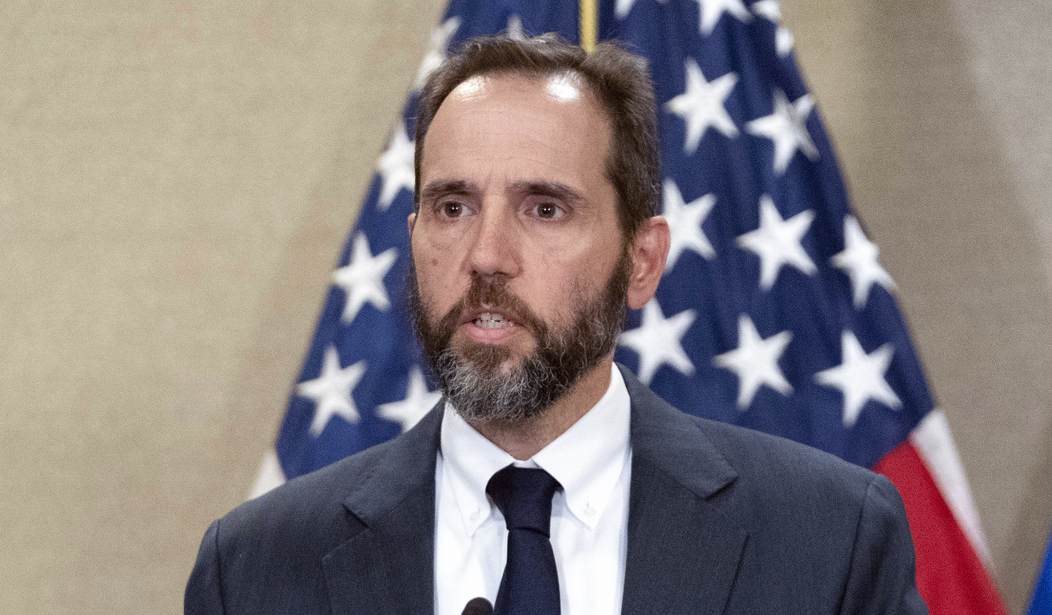Special Counsel Jack Smith has a big question for the Supreme Court. Appointed by Attorney General Merrick Garland in November 2022 to oversee the Biden DOJ's investigation of former President Donald Trump for his actions leading up to and on January 6, 2021, as well as his allegedly improper keeping of federal records after leaving the White House, Smith wants a ruling on Trump's immunity — or lack thereof — before Trump's even been convicted.
Now, in a filing to the Supreme Court of the United States, Smith is asking: "Whether a former President is absolutely immune from federal prosecution for crimes committed while in office or is constitutionally protected from federal prosecution when he has been impeached but not convicted before the criminal proceedings begin."
That question and the Supreme Court's ruling — which Smith asked to be expedited — will determine a lot of what happens over the next several months as Trump's trials play out concurrent with the 2024 Republican presidential primary.
Again citing the "public's interest" in a fast-track trial of Donald Trump, Jack Smith just filed motions to expedite Trump's appeal of Judge Chutkan's ruling related to executive immunity at DC appellate court and SCOTUS.
— Julie Kelly 🇺🇸 (@julie_kelly2) December 11, 2023
Smell the desperation... pic.twitter.com/cwWoICmuVU
"This case involves a paradigmatic issue of imperative public importance: the amenability to criminal prosecution of a former President of the United States for conduct undertaken during his presidency," Smith's filing states. "It requires no extended discussion to confirm that this case—involving charges that respondent sought to thwart the peaceful transfer of power through violations of federal criminal law—is at the apex of public importance. The charges implicate a central tenet of our democracy," he continues. "And the charges allege that respondent conspired to transgress the law in manifold ways: by intentionally using fraudulent means to obstruct the presidential electoral process; by obstructing constitutionally prescribed processes in Congress for counting electoral votes; and by seeking to deprive millions of voters of their electoral choice for President."
Recommended
By asking the Supreme Court to rule on the issue, Smith is preempting what was likely to be a question asked by Trump on appeal if he ended up convicted.
Special Counsel Jack Smith is now seeking to leapfrog the appellate court and ask for a ruling from the Supreme Court on Trump's immunity claims. The only reason for this petition is to seek to guarantee a trial of Trump (and possible conviction) before the election...
— Jonathan Turley (@JonathanTurley) December 11, 2023
...The matter is currently before the D.C. Circuit which is viewed as a favorable court for Smith. However, Smith is trying to avoid any delay in the March trial date, set to begin the day before Super Tuesday...
— Jonathan Turley (@JonathanTurley) December 11, 2023
...The Supreme Court may not view a trial of Trump during the campaign to be as motivating or urgent as does Smith. This is a novel legal argument that the Court would ordinarily prefer to hear the views from the appellate judges.
— Jonathan Turley (@JonathanTurley) December 11, 2023
"The district court rejected respondent’s claims, correctly recognizing that former Presidents are not above the law and are accountable for their violations of federal criminal law while in office," Smith's filing continued. "Respondent’s appeal of the ruling rejecting his immunity and related claims, however, suspends the trial of the charges against him, scheduled to begin on March 4, 2024. It is of imperative public importance that respondent’s claims of immunity be resolved by this Court and that respondent’s trial proceed as promptly as possible if his claim of immunity is rejected," Smith wrote. "Respondent’s claims are profoundly mistaken, as the district court held. But only this Court can definitively resolve them."
More from Smith's filing to SCOTUS:
The government is filing this petition for a writ of certiorari before judgment not only because of the public significance of the issues, but to ensure that the case may be briefed, argued, and decided during the ordinary decisional time for cases argued this Term. As noted above, the district court has scheduled trial to begin on March 4, 2024, and respondent has appealed. Given the uncertain timing of appellate proceedings in the ordinary course, including potential requests for rehearing en banc, certiorari before judgment is appropriate now to allow the Court to provide the prompt and definitive resolution that the issues presented here require. Because of the discretionary nature of this Court’s consideration of this petition, and to avoid any potential delays, the government is concurrently filing a motion to expedite proceedings in the D.C. Circuit, which currently has jurisdiction over the appeal. As that motion explains, the government is seeking prompt resolution of the appeal in time to allow this Court to hear and decide the case this Term in the event the Court opts not to grant the petition for a writ of certiorari before judgment. If the Court grants review, the government respectfully requests that it establish a schedule for briefing and argument that would allow the case to be resolved as promptly as possible. Alternatively, if the Court opts not to grant review immediately, the government respectfully suggests that it consider postponing action on the petition pending further proceedings in the court of appeals, so the Court could grant certiorari immediately upon the issuance of a decision by that court...And if the Court elects not to review this case at this time, it may wish to note that the court of appeals should proceed with sufficient dispatch to permit the Court to hear this case promptly during its current scheduled argument sessions for this Term.
This is a developing story and may be updated.
























Join the conversation as a VIP Member